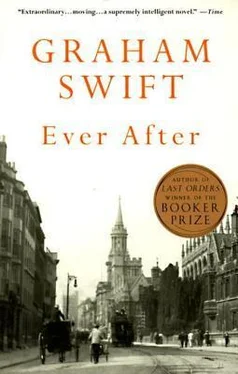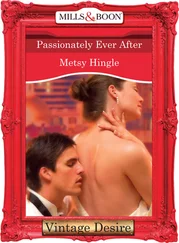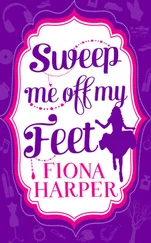I think now of that aerial man, with his ladder and van. His faltering nonchalance. Perhaps it wasn’t just that he thought Ruth was crazy. Perhaps he might have been happy to stay up there longer by the chimney. I see Ruth turning to me, after he’d gone, to share in the joke, her eyes beating her lips to it as always, the sun on the field, a hand in her hair, the wide mock-pity of her laugh: “Poor man! Poor man!” And I think how the aerial man might have been me , how it might have been my lot only to view for half an hour in the course of my day’s work this strangely behaved, this extraordinary, this adorable creature.
You see, nothing else will do. No simulations, fabrications, biographical conjurations. Slowly, yes, slowly you abandon the wilder delusions, the ruses, subterfuges, superstitions of grief. The days of eating meals for one but set for two, of clothes still hanging untouched on hangers exactly as they were left. The moments of indescribable mental concentration when you try to summon out of some recess of reality the exact sound of her footstep, the exact way in which she would turn the key in the lock. The bouts of talking out loud and alone, but not to yourself ( my rehearsal sessions), to the thin, cheating air. The days of signs, traces — dreams. Oh yes, the dreams. Now she has stepped for ever out of her own existence, doesn’t she enter, even more readily, even more lovably, the existence of your dreams?
Yes. Though, tell me, which would be crueller: not to have or to have these dreams?
And what of the other images, the undreamt images? Surely you are lucky — lucky. The films, the videotapes, the hundreds and hundreds of photographs — publicity shots, rehearsal shots. You can turn a page, push a button, press a cassette into its slot, and there will be Ruth — moving, talking, breathing — before you.
But how can I explain it? The pictures mock me. They are, they are not Ruth. I can’t bear to look at them.
And nothing is left but this impossible absence. This space at your side the size of a woman, the size of a life, the size — of the world. Ah yes, the monstrosity, the iniquity of love — that another person should be the world. What does it matter if the world (out there) is lost, doomed, if there is no sense, purpose, rhyme or reason to the schemeless scheme of things, so long as— But when she is gone, you indict the universe.
I would believe or not believe anything, swallow any old make-belief, in order to have Ruth back. Whereas Matthew— Whereas this Pearce guy—
Nothing else. Only the exact filling of the exact space. Only the actual reversal of nature. And now you see the little joke nature has played on me. She has granted me my wish — after a fashion. She has brought me back to life.
And what should I expect now: that I should live for ever?
But the lights are dimming. There is a hush in the auditorium. The curtain is lifting. It is 1957. The marchers are not yet marching, to save the world, along the road to where, once upon a time, I spotted trains, took tea with my mother and, conceivably, was conceived; and the two young people who command our attention still have a quaint, residual feeling that the world has already been saved, that the great cosmic battle for good and evil has already been fought and won — even for their sakes — when they were small. And it is only four years since a new queen rode in a fairy-tale coach to her coronation; and some bright spark has named this age the New Elizabethan Age, as if the mere name of a queen imparted some historical magic and the world were once more waiting to be discovered and explored.
What does he do, this young hero of ours, charged with the task of providing for a first night of bliss? There are no hotels in Camden, and, besides, that is too close to home. His thoughts and his steps take him to the vicinity of Paddington Station, where he eyes from outside, with an intensity of circumspection (he should have worn a hat with the brim pulled down and turned up the collar of his coat), the ranks of plausible hotels that accost the traveller hying to and from the West Country.
It was here, of course, that he first alighted in the capital, in the classic guise of the indigent waif, scorned by his elders, come to find his future in the big city. (Now he has found his future.) And it was from Paddington Station, which still reeks of coal and steam though the Great Western Railway is no more, that the trains that once thrilled him in his younger days set forth. And it has already occurred to our young hotel-assessor that the station in his dream, so blessedly adapted to the needs of two very important travellers, was Paddington.
He selects a hotel. Are names significant? It is called the Denmark Hotel. The white stucco seems newly painted. It has stone steps, leading up to its fanlighted front entrance, and, so far as he can see through the glass-panelled door, what lies within is not outrightly forbidding (he imagines the fearsome business of signing the register) nor blatantly at odds with its outer pretensions. There are three hotels in the terrace, and it is the only one to have its front steps thoughtfully whitewashed at the edges. There is, of course, the thorny question of the price.
He doesn’t go in. Later that day he telephones, not from his Camden quarters, where Mrs Nesbitt generously allows her lodgers to make use of the phone — while stationing herself squarely within earshot — but from a call-box in the street. He thinks he has prepared a casual and credible style of inquiry. He is even ready, if needs be, to spin some yarn about how they will have travelled down — he and his wife, that is — from the north that day and will be getting a train to Somerset the next morning (he has in mind Weston Super Mare: it is August, after all, the holiday season).
But he is caught by surprise by the female voice at the other end, which is not so far removed from Mrs Nesbitt’s, though with a practised smarminess that Mrs Nesbitt cannot muster: a voice that seems to go with a certain length of earring, a certain weight of bosom and a certain adroitness at sizing people up. And he is tripped up by the perfectly feasible “For one night only?” and by the abrupt “And whom is this speaking, sir?” Up to this point he has thought: what is wrong with his own name? But, suddenly panicked, he plucks out of the air the name Nesbitt. “Nesbitt. Mr Nesbitt.”
Yet the thing is done. He establishes that the price is three pounds ten shillings. A small fortune. A room is booked for the following Sunday. And that night, at the Blue Moon Club, he tells her (she giggles; he feels a little stupid) that she will have to remember that she is Mrs Nesbitt.
It is 1957. All this stealthiness is not unwarranted, if perhaps overdone. But what true lovers were they who never learnt to speak in whispers or tread on tiptoe? They arrange to meet in a café on Camden High Street, from where they will take a taxi to Paddington. He tells Mrs Nesbitt (this is getting confusing) that he is going to his mother’s and stepfather’s for the night, and packs a medium-sized suitcase with redundant clothing. No doubt Mrs Nesbitt will think this excessive for a journey of one night and that a Sunday evening is a strange time to be beginning a journey home. But there is nothing he can do about this: on Sunday nights the Blue Moon is closed; and his baggage has to fit more than one alibi. He takes to the street, suitcase in hand, anxiously eyeing his watch, and it occurs to him, again, that he is re-enacting his dream.
It is a wet evening, shot with interludes of silky, brassy light. She is first at their meeting place, carrying a small travelling bag and wearing a borrowed ring. He is, by this time, in a fair fever of nerves, but her presence calms him, rallies him, instructs him. He realises that what this is is simply an exercise in acting (one of the few of his life). Tonight they will have to pretend — and not pretend — to be other people. Her smile imparts a spirit of mischief and audacity he has quite overlooked. Let us give this night its due.
Читать дальше












